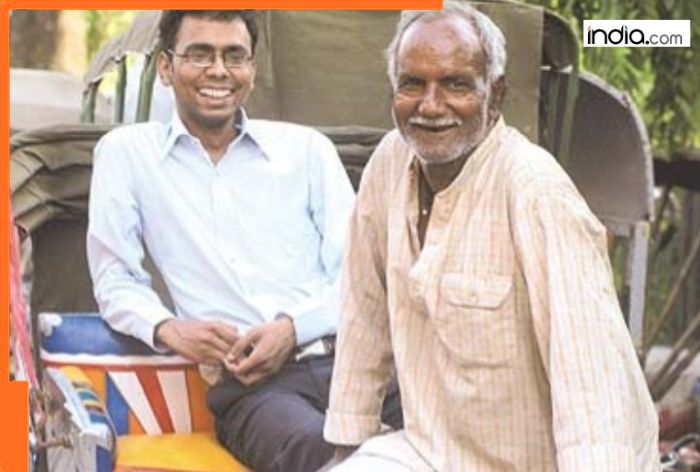IAS Govind Jaiswal was born into a poverty-ridden family in Varanasi, Uttar Pradesh. His father, Narayan Jaiswal, was a rickshaw puller, who bought and rented a few rickshaws to supplement his modest earnings from his job at a local government ration shop.
UPSC Success Story: Amidst a sea of UPSC success stories floating around on the internet, there a few which are not only inspirational but also heartwarming. One such story is the journey of IAS Govind Jaiswal, a son of a humble rickshaw puller, who faced insults during his childhood for being poor, but persevered to crack the UPSC Civil Services Examination (CSE) and became an IAS officer.
Who is IAS Govind Jaiswal?
Born into a poverty-ridden family in Varanasi, Uttar Pradesh, Govind Jaiswal’s father, Narayan Jaiswal, was a rickshaw puller, who bought and rented a few rickshaws to supplement his modest earnings from his job at a local government ration shop.
Govind’s family was financially stable until situation took a turn, sending them into the bowels of poverty. However, despite the dire financial circumstances, Narayan never compromised with his children’s education and ensured all of them completed their studies. All four of Narayan’s kids, including his three daughters are graduates.
Due to abject poverty, Govind Jaiswal had a tough childhood, as the family lived in a one-room home where electricity was a novelty.
During his childhood, Govind often faced insults and taunts for being poor, with some questioning why he even bothered to study. “What will you gain by studies? You can probably own two rickshaws,” they taunted, hinting that he was doomed to the same fate as his family.
A life-changing incident
While Govind Jaiswal faced several incidents of discrimination during his childhood due to his poverty, there was one particular event which completely changed his outlook on life and set him on the journey of becoming an IAS officer.
When he just 11, Govind was insulted and thrown out of a friend’s house because the family was wealthy, while Jaiswal was the son of a lowly rickshaw puller. At first, young Govind could not comprehend the reason for this disrespect, but an older friend later explained how the “real world” works and how the poor are always looked down upon by the wealthy.
Govind’s friend cautioned him that he would have to face such insults for the rest of his life, unless he changed his circumstances. Govind asked his friend what the highest and most respected position there is, to which the older boy replied that IAS officer was the most prestigious job in India.
The friend’s advice was burned in young Govind’s mind and from that day on, he embarked on the path to become an IAS officer, battling poverty, hunger and hardships along the way.
Rickshaw puller’s son becomes IAS
After completing his graduation, Govind Jaiswal started preparing for UPSC CSE but was unable to focus on studies as the entire family lived in one room. Govind decided to move to Delhi to join UPSC coaching classes, and his decision was supported by his family, both financially, and emotionally.
However, the journey was not easy as money was scarce, forcing Govind to often skip meals to save some cash while he also gave math tuitions to junior students to earn some income while preparing for UPSC exams.
Govind’s father sold a small piece he owned to finance his son’s dream of becoming an IAS officer, and soon Narayan’s health deteriorated, and he could not pull rickshaws anyone, plunging the family deeper into poverty.
Govind knew he had only one shot at success and unlike others, he could not afford to wait for a second or third attempt. “My circumstances and hardships left me with no other option. I couldn’t settle for lower government jobs or start a business as I had no capital. My only option was to work hard on my studies,” Govind once stated in an interview.
Finally, Govind Jaiswal, the son of a humble rickshaw puller from Varanasi, cracked UPSC CSE with flying colours in 2006 with an impressive All-India Rank of 46, and achieved his boyhood dream of becoming an IAS officer. He was only 22 at the time.
Govind spent his first salary towards medical treatment for his father’s leg, which he had injured while pulling rickshaws for a living and providing a fighting chance at success to his children.

